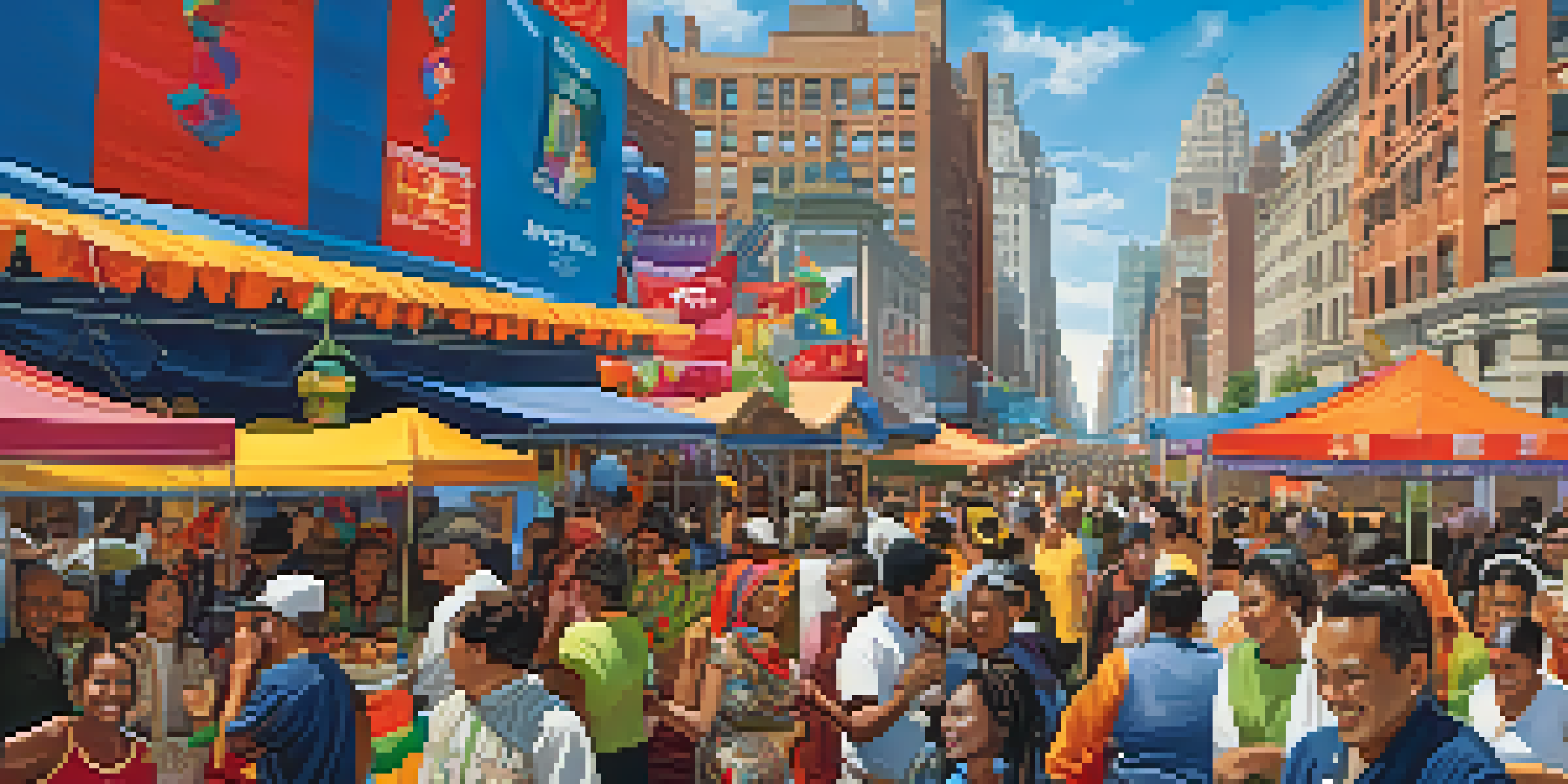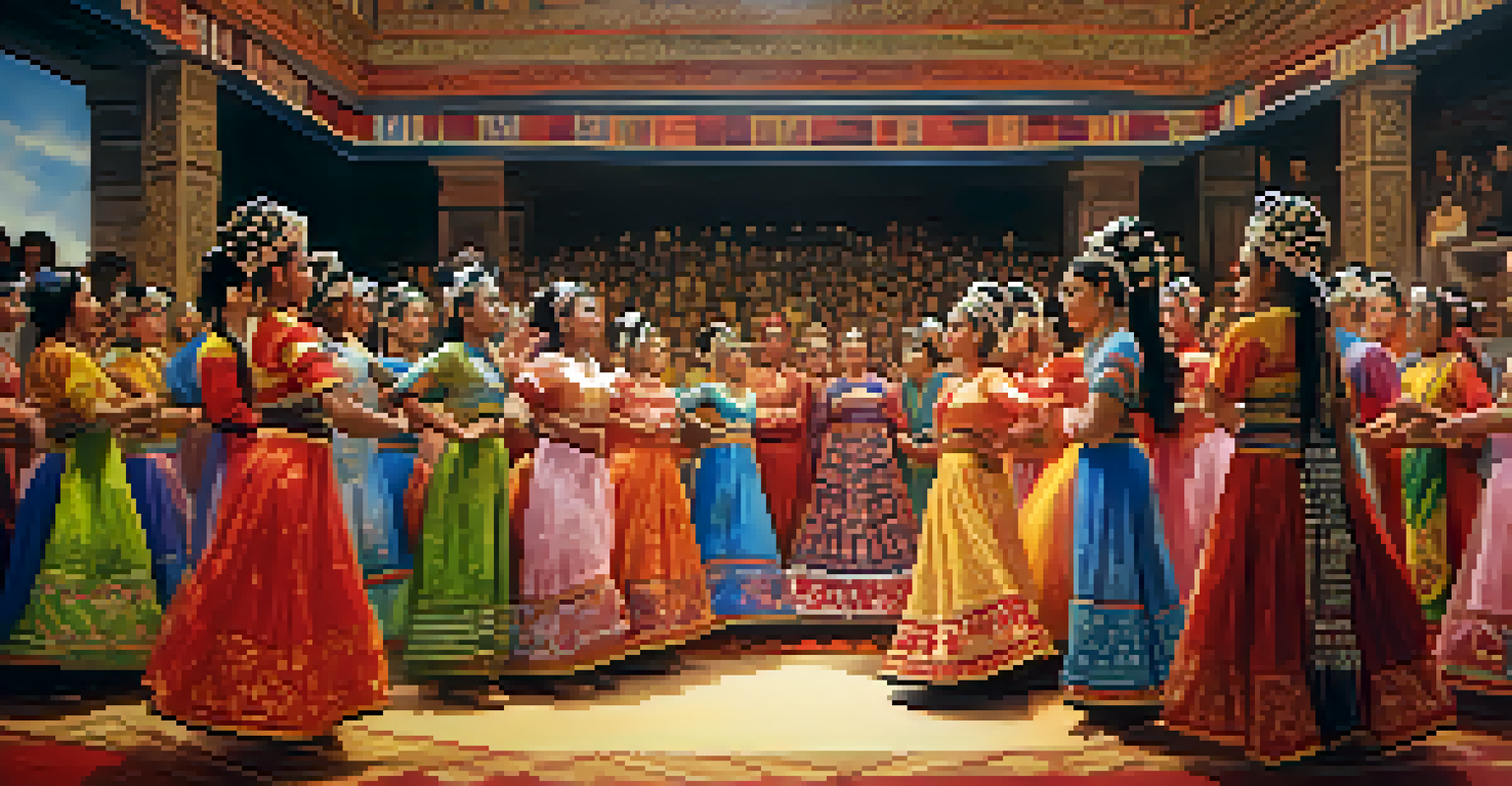Cultural Exchange Programs: A Gateway to NYC's Diversity

Understanding Cultural Exchange Programs and Their Purpose
Cultural exchange programs serve as bridges connecting people from different backgrounds, fostering understanding and appreciation. These initiatives allow participants to immerse themselves in new cultures, often leading to lifelong friendships and valuable experiences. By sharing traditions, languages, and customs, participants contribute to a rich tapestry of global perspectives, which is particularly vibrant in a city like New York.
The essence of the beautiful is unity in variety.
In the hustle and bustle of NYC, cultural exchange programs help break down barriers that often exist between communities. They encourage dialogue and collaboration, allowing participants to explore shared values while respecting differences. This exchange of ideas not only enriches individual lives but also strengthens community bonds, weaving a more inclusive social fabric.
As NYC is a melting pot of cultures, these programs play a crucial role in celebrating the city’s diversity. They can take various forms, such as student exchanges, internships, or volunteer opportunities, all designed to promote cross-cultural understanding. Ultimately, these programs reflect the essence of New York—an ever-evolving city shaped by the contributions of countless cultures.
Impact of Cultural Exchange on Personal Growth
Participating in cultural exchange programs can be a transformative experience that shapes personal growth. Stepping outside one’s comfort zone, participants often discover new passions, develop empathy, and gain a broader worldview. This journey of self-discovery can lead to enhanced communication skills and increased confidence, essential traits in today’s interconnected world.

For many individuals, living in a different culture can challenge preconceived notions and stereotypes. By engaging with locals and experiencing daily life from their perspective, participants break down barriers and foster mutual respect. These experiences often lead to a greater appreciation for cultural nuances, which can have lasting effects on personal and professional relationships.
Cultural Exchange Fosters Understanding
Cultural exchange programs connect diverse communities, promoting appreciation and respect through shared experiences.
Moreover, the friendships formed during these exchanges often transcend borders, creating a global network of contacts. These connections can be invaluable in both personal and career development, opening doors to new opportunities and collaborations. In essence, cultural exchange programs pave the way for growth that extends far beyond the duration of the experience.
Enhancing Career Opportunities Through Cultural Exchange
Cultural exchange programs can significantly enhance career prospects for participants. Employers increasingly value candidates with international experience, as they often possess unique skills and perspectives that can contribute to a diverse workplace. Engaging with different cultures equips individuals with adaptability, problem-solving skills, and creativity—all essential attributes in today’s global job market.
We are all different, but we share the same human spirit. Perhaps it's human nature that we adapt and survive.
Additionally, language skills gained through cultural exchange can set candidates apart in competitive fields. Whether it’s mastering a new language or improving communication abilities, these skills are highly sought after. Furthermore, the ability to navigate diverse environments effectively shows potential employers that a candidate can thrive in a variety of settings.
Networking opportunities play a significant role in career advancement as well. Through cultural exchanges, participants often meet professionals in their field, leading to internships, job offers, or mentorships. This blend of experience and connections helps individuals build a robust foundation for their careers, reinforcing the idea that cultural exchange is not only enriching personally but also professionally.
Cultural Exchange Programs: A Platform for Global Citizens
In an increasingly globalized world, cultural exchange programs cultivate global citizens who are aware of and engaged with international issues. Participants often return home with a broader perspective on global challenges such as climate change, social justice, and economic inequality. This awareness empowers individuals to take action and contribute positively to their communities.
The values learned during these exchanges often inspire participants to become advocates for change. By sharing their experiences and insights, they can raise awareness and mobilize others to embrace diversity. This ripple effect can lead to a more informed and compassionate society, highlighting the importance of cultural exchange in fostering global citizenship.
Personal Growth Through New Cultures
Participants in cultural exchange programs often experience transformative personal growth by stepping outside their comfort zones.
Moreover, cultural exchange programs often encourage participants to engage in volunteer work or social initiatives upon their return. This commitment to service reflects a deep understanding of the interconnectedness of humanity. Thus, these programs not only enrich individual lives but also contribute to the betterment of society as a whole.
Celebrating NYC's Cultural Festivals: A Showcase of Diversity
New York City is home to an array of cultural festivals that celebrate its rich diversity, many of which are deeply rooted in cultural exchange. Events like the Lunar New Year Parade, Diwali Festival, and West Indian American Day Carnival bring together people of different backgrounds to share their traditions. These vibrant celebrations create an opportunity for participants to engage with various cultures firsthand.
Attending these festivals allows participants to experience the essence of different cultures through food, music, and art. For example, the flavors of global cuisine, from spicy Caribbean dishes to savory Asian delicacies, can be an adventure for the palate. Such immersive experiences enhance cultural understanding and appreciation, making NYC a living classroom for exchange participants.
Additionally, these festivals often feature workshops and performances that further educate attendees about the cultures being celebrated. This interactive approach creates a sense of community and belonging, inviting everyone to partake in the festivities. By celebrating diversity in such an inclusive manner, these events reflect the spirit of cultural exchange and the vibrancy of New York City.
The Role of Educational Institutions in Cultural Exchange
Educational institutions play a pivotal role in facilitating cultural exchange programs, often serving as the initial point of contact for participants. Many colleges and universities partner with international organizations to create exchange opportunities that are both enriching and accessible. This collaboration allows institutions to broaden their horizons and promote a culture of inclusivity among students.
Through study abroad programs, students can immerse themselves in different educational systems, gaining unique perspectives on global issues. These experiences not only enhance academic learning but also foster personal development, as students learn to adapt to new environments. This adaptability is crucial in an increasingly globalized world, where cultural competence is an invaluable asset.
Career Benefits of Cultural Exchange
Engaging in cultural exchanges enhances career opportunities by developing unique skills and valuable global networks.
Moreover, educational institutions often host international students, creating diverse classrooms that reflect global society. This melting pot of ideas and experiences enriches the learning environment for all students. By embracing diversity in education, institutions contribute to the overall mission of cultural exchange, preparing students to become informed and engaged global citizens.
Challenges Faced in Cultural Exchange Programs
While cultural exchange programs offer numerous benefits, they are not without challenges. Participants may face cultural shock, homesickness, or language barriers that can hinder their experience. Adjusting to a new environment can be daunting, and without proper support, some may struggle to fully engage with the culture they are immersing themselves in.
Additionally, logistical issues such as housing, funding, and visa processes can create obstacles for aspiring participants. Navigating these challenges requires careful planning and open communication between organizers and participants. By addressing these concerns proactively, programs can ensure a smoother experience and help participants thrive in their new surroundings.

Lastly, it’s essential to recognize that cultural exchange is a two-way street. While participants learn from their host culture, it’s equally important for the host community to learn from their guests. Building genuine connections and fostering mutual respect can alleviate some of the challenges faced, ultimately leading to a more enriching exchange for everyone involved.